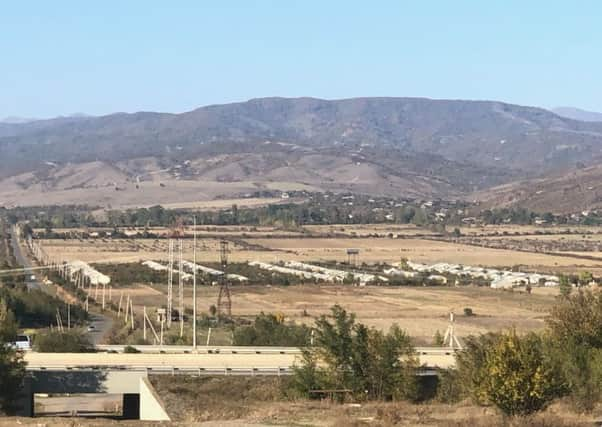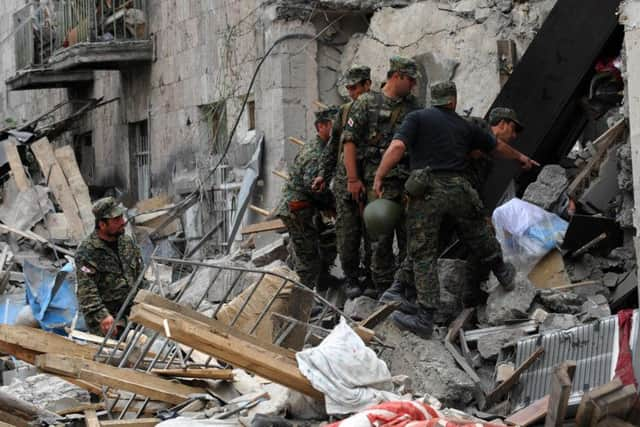Russia’s annexation of Georgian territory must not be forgotten – Struan Stevenson


There is one over-riding impression that strikes anyone meeting with politicians in Georgia – they all seem to be young, highly educated, competent, articulate and multi-lingual. From all sides of the political spectrum there is a prevailing sense of optimism, a feeling that Georgia has a great future and that they are determined to make it happen.
That sense of confidence is reflected even in the names of the mainstream and largely pro-Western political parties. Currently in power is the Georgian Dream – Democratic Georgia party. The main opposition movement is the European Georgia Party, an offshoot of the United National Movement, the former governing party originally founded by Mikheil Saakashvili, the enfant terrible of Georgian politics. Saakashvili, a former president of Georgia, was stripped of his Georgian citizenship by his arch-nemesis Bdzina Ivanishvili, a multi-billionaire oligarch and former Prime Minister of Georgia, who founded the Georgian Dream Party.
Advertisement
Hide AdAdvertisement
Hide AdIn sharp contrast to our own current experience in the UK, there is huge support for Georgia to join the EU. Opinion polls repeatedly show public backing of over 80 per cent and Georgia is now considered to be the ‘front-runner’ in the long list of Balkan and trans-Caucasian countries vying to join the EU and Nato, although a senior opposition politician said: “It is easy to be the front runner when nobody else is running.”


The EU has reciprocated by spending a generous €120 million (about £105m) annually in Georgia, where the 3.7 million population are understandably grateful recipients. Nevertheless, 50 per cent of the Georgian economy still relies of agriculture and there is a huge disparity between the per capita GDP of $20,000 a year (about £16,000) in the capital Tbilisi, and the paltry $2,000 in most rural areas. Serious and successful efforts have been made to tackle poverty, corruption and electoral fraud and the Georgian economy is now growing at an annual rate of five per cent.
But there is a clear understanding among all of the political parties that rural, agricultural poverty will have to be confronted and it is emerging as a key issue in the campaign for the autumn 2020 elections.
Russian aggression
Against this predominantly positive background is, sadly, the looming dark cloud of Russian aggression. More than 20 per cent of Georgian territory is now occupied by Russia. The regions of Abkhazia and South Ossetia, both scenes of violent separatist conflicts which left thousands dead and tens of thousands homeless in August 2008, are now virtual no-go areas.
Putin allows limited visits to Abkhazia by the United Nations Development Programme (UNDP), but South Ossetia has become a Russian military base and the ill-defined demarcation lines established by the Russians are now blockaded with tangled razor wire, guarded by armed soldiers in military watchtowers. This illegal ‘border’ slices through villages, fields and gardens.
Georgians attempting to cross the wire to visit friends and family or even to attend weddings and funerals, are regularly arrested, taken to court and fined.
Hundreds of thousands were forced to flee during the 2008 war, when Russia invaded with a colossal military force, claiming they were there to protect the pro-Russian Abkhazians and Ossetians, the same excuse Putin used to annex Crimea.
Abkhazia formerly had a population of 560,000. It is now 160,000. South Ossetia’s pre-war population of 120,000 is now only 20,000. Ludicrously, both disputed territories have now been recognised as sovereign independent states by the usual suspects of Syria, Venezuela and Nicaragua, as well, of course, as Russia.
Advertisement
Hide AdAdvertisement
Hide AdGeorgian government ministers claim that those who remain inside the two occupied territories routinely suffer human rights abuses, a lack of freedom of expression and widespread discrimination; their children are even denied education in their own native Georgian language.
Villages destroyed
Scores of Georgian villages were completely destroyed by the Russian-backed separatists, particularly in South Ossetia and ethnic cleansing forced hundreds of thousands to flee. Sprawling camps house these internally displaced persons (IDPs) near the Abkhazian and South Ossetian demarcation lines. Georgian politicians say that these people have lived in a state of dependency for the past 11 years as they are still suffering from post-traumatic stress as a result of the violent conflict. They cannot return to their homes and they are reluctant to integrate into the wider Georgian society.
The difficult task of keeping a watchful eye on this tense situation has fallen to the EU Monitoring Mission (EUMM), an unarmed peacekeeping operation with several hundred monitors from various EU member states. The EUMM works with an annual budget of around €18 million and has its headquarters in Gori, which, ironically, was also the birthplace of Stalin!
The current Georgian Dream government has several key issues to deal with. They must try to resolve the standoff with Russia. They must deal with threats from Mikheil Saakashvili, who says from his current home in Ukraine that he intends to return to Georgia, where he faces instant arrest. They must respond to accusations that Ivanishvili is pulling the democratic strings in Georgia. And they must oversee the implementation of a new and radical system of electoral reform, which will see a fully proportional system introduced at the next elections.
These are just a few of the challenges facing the Georgian government and its newly elected president Salome Zourabichvili, a former Green and the first woman to hold the post. But Georgia has dealt with bigger challenges in the past. It has been occupied by the Mongols, Romans, Persians, Turks and Russians; even Jason and the Argonauts travelled there in 2,000 BC in search of the legendary Golden Fleece.
Georgia is known as the “cradle of wine”. Ancient amphora used for wine-making date back 8,000 years. Today their wines, mainly from the beautiful area of Kakheti in the foothills of the Caucasus, are eagerly sought by connoisseurs worldwide and Russia is their main customer. With a glass of rich, dark ruby-red Georgian wine made from the rare and prized Usakhelari grapes in one hand, and a copy of the EU’s fabled acquis communautaire or book of rules in the other, it would be difficult to ignore the pleas of the Georgians for EU and Nato membership, especially when there will shortly be a vacancy in the former caused by Brexit. As they say in Georgia when glasses are clinked together “gaumarjos”!
Struan Stevenson was a Scotttish Conservative MEP from 1999-2014. He is currently an award-winning author and international lecturer
